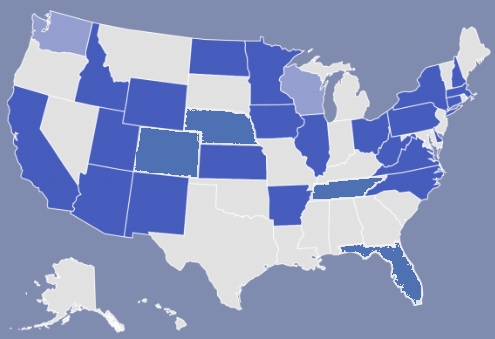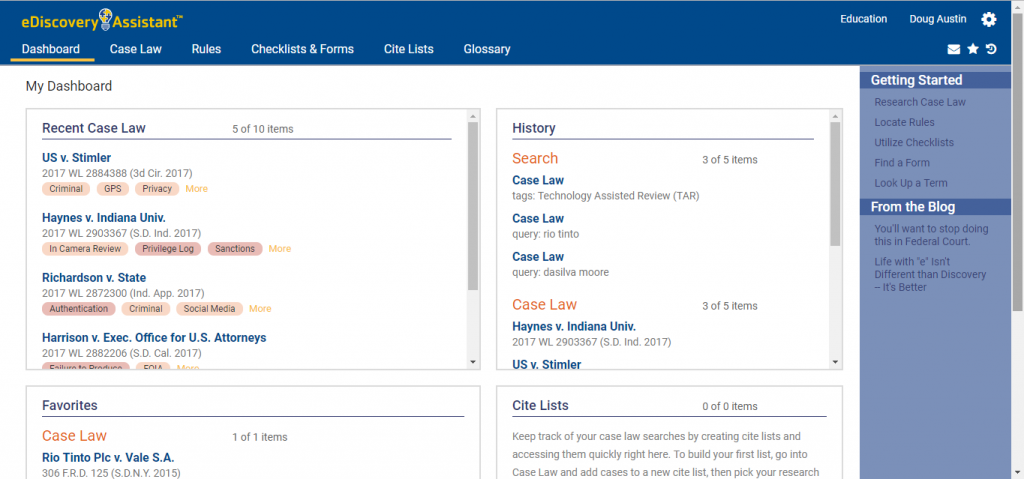EDRM Announces Five New Projects: eDiscovery Best Practices
Did anybody doubt that EDRM under the leadership of Mary Mack and Kaylee Walstad was going to be doing BIG things? If you did doubt it, here’s an announcement that signals that EDRM will be busy creating and improving frameworks, resources and standards within the eDiscovery community.
Last week, EDRM announced five new projects and is seeking new contributors for them. They are:
Data Sets: This new project is being championed by Cash Butler, founder of Clarilegal, and is seeking project participants. “Everyone still tests and demonstrates with the very old and familiar data set that is comprised primarily of Enron email and attachment data,” claims Cash Butler. “A new modern data set needs to be created that is focused on modern data types as well as email. Slack, Snapchat, Instagram, text messaging, GPS and many other data types that are needed for testing and demonstrating how they process and present in a useful way. In addition, to creating the new data set we will also look to form a framework for community members to easily add, curate and update the data set to stay current.”
One word: Hallelujah! We’ve needed new up-to-date data sets for years to replace the old Enron set, so I’m hopeful this team will make it happen.
Processing Specifications: John Tredennick, founder of Merlin Legal Open Source Foundation is championing this project with the help of co-trustees Craig Ball, president, Craig D. Ball P.C. (who recently created a processing primer) and Jeffrey Wolff, director of eDiscovery services and principal architect, ZyLAB. The Processing Specifications project will run in parallel with the Merlin Foundation’s programming project for processing.
Data Mapping: Eoghan Kenny, associate, senior manager data projects and Rachel McAdams (no, not her), data projects, at A & L Goodbody, Ireland are championing this project, which the need has arisen due to the new SEAR Act (senior executive accountability regime) to help provide frameworks around who is responsible for what data and where it resides. “The importance of data mapping has grown enormously in Europe – not just for GDPR and investigation purposes, but also to help organizations deal with the increasingly active regulatory environment,” says Kenny. “However, most of our clients struggle with data mapping as it is a new concept to most organizations, with no clear business owner, that often sits in limbo between the “business” and “IT”! The goals of this project are to build frameworks for data mapping exercises, and provide clear guidelines on what the process should look like, because the better an organization understands its data, the cheaper it is to comply with any discovery or investigation obligations.”
State eDiscovery Rules: Suzanne Clark, discovery counsel at eDiscovery CoCounsel and Janice Yates, senior e-discovery consultant at Prism Litigation are co-championing this project and how the State Rules relate to the eDiscovery Federal rules in place. The vision for the State eDiscovery Rules project is to provide a starting point for attorneys to quickly reference the rules in different states and compare and contrast to the federal rules with the various state rules relating to eDiscovery. For example, if an attorney is involved with a case in a state where they are not accustomed to practicing, this EDRM resource will allow them to quickly get up to speed on that state’s rules, where they differ and where they align with the federal rules. “The project work happening at the EDRM is impressive,” says Suzanne Clark. “The time and talent that the project leads and participants donate to the cause of advancing eDiscovery knowledge and good practices will surely serve to advance the industry and legal practice in the discovery realm.” The project will start with Florida and Michigan and are looking for more contributors from other states.
I look forward to this as we need an up to date resource here – I’m not sure that the ones I’ve covered in the past are being actively updated.
Pro Bono: This project was just launched and has had an overwhelming reach out from people in every area, attorneys, paralegals (and associations), litigation support professional, service providers, platforms, corporations and those in need. We are still seeking assistance as the need for access to justice is great. Stewarded by BDO director, George Socha and HB Gordon, eDiscovery manager for the Vanguard Group, the Pro Bono project will create subgroups to accelerate providing eDiscovery services to those in need.
As the announcement notes, projects, both ongoing and newly initiated, will be advanced at the EDRM Summit/Workshop 2020 at Duke University School of Law, June 24-26. I’ll have more to say about that as we get closer to it, but it certainly sounds like it will be very busy! I’m certainly planning to be there!
So, what do you think? Are you interested in participating in EDRM? As always, please share any comments you might have or if you’d like to know more about a particular topic.

Sponsor: This blog is sponsored by CloudNine, which is a data and legal discovery technology company with proven expertise in simplifying and automating the discovery of data for audits, investigations, and litigation. Used by legal and business customers worldwide including more than 50 of the top 250 Am Law firms and many of the world’s leading corporations, CloudNine’s eDiscovery automation software and services help customers gain insight and intelligence on electronic data.
Disclaimer: The views represented herein are exclusively the views of the author, and do not necessarily represent the views held by CloudNine. eDiscovery Daily is made available by CloudNine solely for educational purposes to provide general information about general eDiscovery principles and not to provide specific legal advice applicable to any particular circumstance. eDiscovery Daily should not be used as a substitute for competent legal advice from a lawyer you have retained and who has agreed to represent you.











